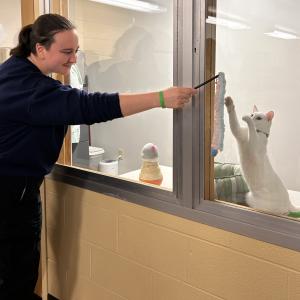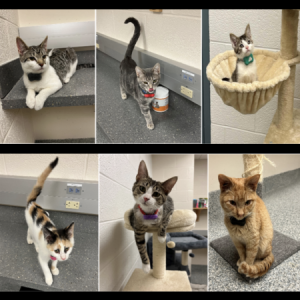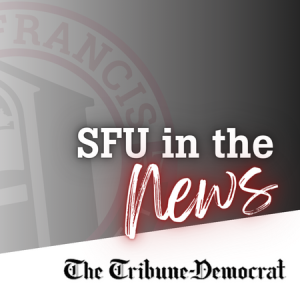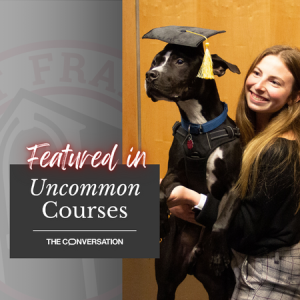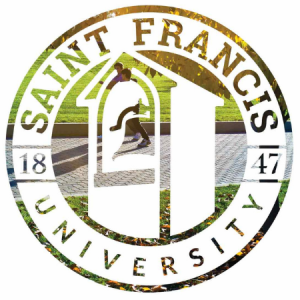
School of Health Sciences & Education
Psychological Science, B.S.
Introduction
Earn your B.S. degree in Psychological Science from Saint Francis University
A bachelor of science degree in psychological science from Saint Francis University prepares students for their futures as responsible global citizens. Our students have the flexibility to tailor their studies to best fit their future goals. As a psychology major, you will have opportunities to learn about the field through fundamental coursework in a variety of sub-disciplines while gaining valuable practical experience through an integrated research component of the psychology curriculum.
Offered: On-Campus
hands-on labs and clinical research experiences in neuroscience, animal behavior, human psychology, and more
student and faculty-student collaborative research projects
psychology in action through community-engaged experiences and research
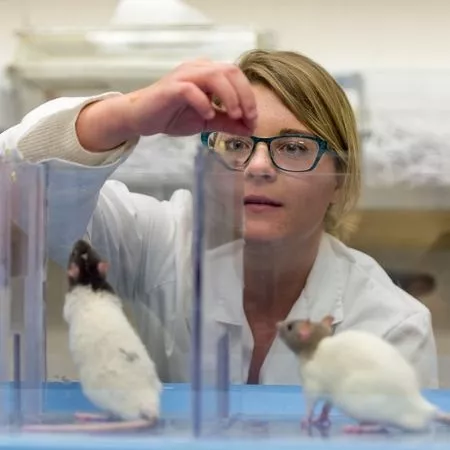
The SFU Learning Experience
Psychology the Saint Francis Way
Our students have plenty of opportunities to gain psychology experience through their coursework and through hands-on activities beyond the traditional classroom format including labs, community engaged projects, clubs, self-study, and more. Our faculty’s commitment to academic excellence, our student-centered approach to learning, and our focus on undergraduate research allow students to develop an understanding of not just theories and concepts, but the application of psychology in our daily lives.
Study (and grow) the mind!
Where your mind can take you is all up to you! Graduates of the psychology program are well-prepared for entry-level employment in the field and for advanced study in graduate or professional schools.
Hands-on Learning: Our majors thrive on experiential learning. That may include applying behavioral analysis in training rescue dogs alongside the local Humane Society. Or they may work through a simulated scenario in our new state-of-the-art Experiential Learning Lab. Others analyze data to provide real-world value for community partners.
Research: A two-semester research sequence allows students to understand research methodology by designing and completing their own research project. Students are encouraged to publish their course research which is a unique opportunity for undergrads.
Internships: Apply your knowledge and skills through internship opportunities in a variety of professional settings including inpatient or outpatient clinics, residences for teenagers, agencies for older adults, child development centers, after-school programs, equine therapy programs, and human resources.
Experiences: Join the psychology club, and expand your academic experience through field trips and other out-of-the-classroom activities — visit the zoo, organize fundraisers, host psychology movie nights, and lead discussions on topics of the mind.
CURRICULUM & COURSES
What You’ll Learn in the Psychology Program
Students in the undergraduate psychology program at Saint Francis are introduced to natural and social scientific investigations of behavior and mental processes. The curriculum engages students in research and scholarly activity, while also encouraging them to apply coursework in internships, study abroad, and/or community service.
Within a liberal arts and sciences tradition, students have the option to earn a bachelor's degree, and are required to add either a double major or a minor or concentration to their studies, providing them with the versatility they need to find success!
Psychology Paths to match your future plans:
Detailed curriculum paths are below. Your faculty advisor is here to help you navigate the options.
Bachelor of Science in Psychological Science (4 options)
| Degree | Description | Curriculum |
|---|---|---|
Psychological Science, B.S.
| requires students to choose a minor or a second major if pursuing this psychology degree without a concentration | |
Pre-Medicine Concentration
| prepares students to attend medical school, perhaps to study psychiatry or neurology
| |
Neuroscience Concentration
double major required in Psychological Science & Biology | for students who enjoy making connections across fields of science and social science, and who are curious about the structure and function of our brain, sensory systems, and neuromuscular systems | |
(4+3) leading to a Doctor of Physical Therapy | for students who enjoy making connections across fields of science and social science, and who are curious about the structure and function of our brain, sensory systems, and neuromuscular systems |
Psychology Learning Objectives
The psychology department follows the learning objectives established by the American Psychological Association (APA) for an undergraduate psychology curriculum. Student learning outcomes center around five foundational areas.
Knowledge of Psychology
Students will be able to describe key concepts, principles, and overarching themes in psychology.
Students will develop a working knowledge of psychology’s various content domains.
Students will be able to describe applications of psychology.
Scientific inquiry and critical thinking
Students will be able to use scientific reasoning to interpret psychological phenomena.
Students will be able to demonstrate psychological information literacy.
Students will engage in innovative and integrative thinking and problem solving.
Students will be able to interpret, design, and conduct basic psychological research.
Students will be able to incorporate sociocultural factors within their scientific inquiries.
Ethical and social responsibility in a diverse world
Students will be able to apply ethical standards to evaluate psychological science and practice.
Students will build and enhance interpersonal relationships.
Students will be able to adopt values that build community at local, national, and global levels.
Communication
Students will demonstrate effective writing for different purposes.
Students will exhibit effective presentation skills for different purposes.
Students will interact effectively with others.
Professional development
Students will apply psychological content and skills to career goals.
Students will exhibit self-efficacy and self-regulation.
Students will refine project management skills.
Students will enhance teamwork capacity.
Students will develop a meaningful professional direction for life after graduation.
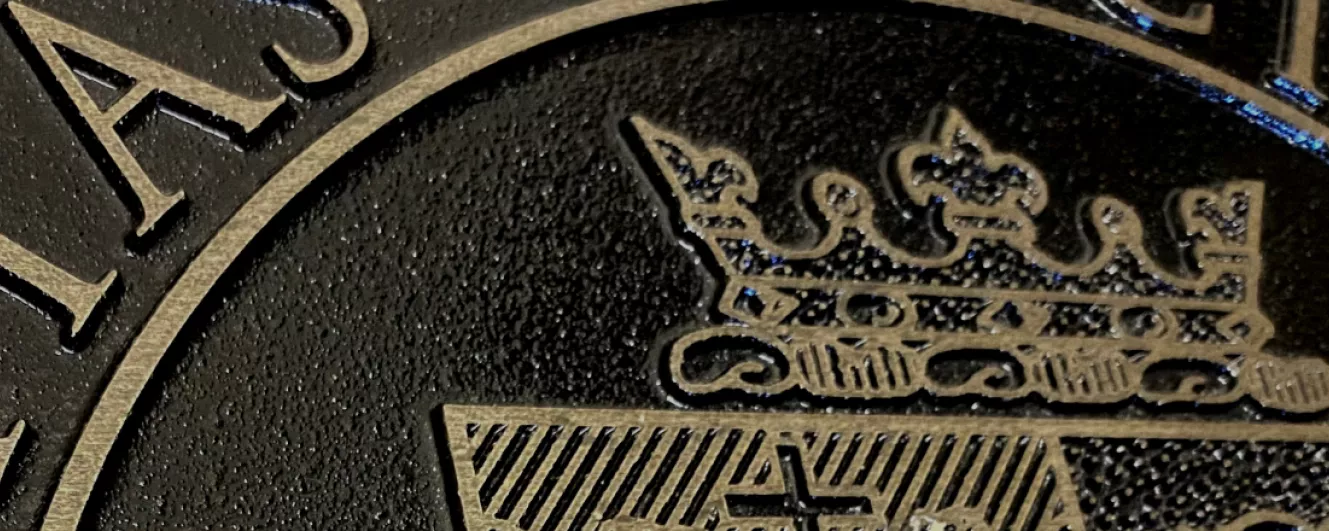
Great Minds to Teach the Mind
Our faculty have expertise in developmental psychology, research methods, gerontology, health psychology, clinical and counseling psychology, neuroscience, and memory and cognition. Their commitment to academic excellence is incomparable, and their dedication to their students goes above and beyond.
Program Chair: Dr. Suzanne Black, sblack@francis.edu, 814-472-3091
Career Outlook in Psychology
The study of psychology offers endless possibilities. Thanks to the solid foundation of our curriculum and the versatility of our psychology degree, graduates find themselves well-prepared for entry-level positions, graduate school, or professional school. Possible career choices include advertising agent/manager, affirmative action representative, alcohol/drug abuse counselor, behavior analyst, caseworker, corrections or parole officer, guidance counselor, marriage counselor, mental health worker, psychiatrist, psychologist, rehabilitation counselor, and so much more.
Watch an interview with Dr. Erin Reifsteck as she discusses how her time at Saint Francis University prepared her for an exciting career in Sports Psychology.
FAQs
Frequently Asked Questions About Psychology and Saint Francis University
-
A degree in psychology provides so much opportunity for diverse career paths — from psychiatrist to career counselor to gerontologist — that graduates can tailor their studies to their goals. You can attend graduate school, conduct research, become a guidance counselor or academic advisor, work as a case manager or child welfare worker, become a bank manager or customer service manager, and so much more!
-
The Psychology department’s Canine Learning and Behavior course is a semester-long class that studies and trains rescue dogs in order to analyze events and consequences that contribute to their specific behaviors.
In this popular course:
- Students gain hands-on learning as they apply concepts of conditioning, reinforcement and behavioral analysis.
- Dogs get a second chance at life through a partnership with the Central PA Humane Society.
- Students train their dogs to receive their American Kennel Club Canine Good Citizen Certification.
- As the dogs successfully complete the class, they receive a diploma and SFU graduate collar tag at a special graduation ceremony in their honor.
- Happy endings! After Puppy Graduation, the dogs are adopted to vetted, "furever" families.
Watch a news clip on one of our "puppy graduation" ceremonies:
https://wjactv.com/news/local/puppy-graduation-at-saint-francis-univ
-
As a psychology student, you will undertake a 2-semester research sequence that allows you to understand research methodology by designing and completing your own research project. There is even a live rat lab where you can learn to train your own rat. Recent projects have focused on:
- personality type and school major
- gender, self-esteem, and Facebook “likes”
- effect of socially awkward context on mobile phone reliance
- physical fitness and GPA
- parent-child fear connections
- the female athlete triad
- gender difference in online dating advertisements
- birth order and motivation
- personality type and Wii bowling performance
- Music and comprehension
Psychology majors are encouraged to conduct research or participate in ongoing research projects. Students may join a faculty-sponsored research team, or they may design their own project. Independently designed projects require faculty sponsors.
-
Recent PSYC Dept. Publications 2021/22
Publication:
Remillard, K.S., & Moist, M.L. (2022). Developing Professionals: Preservice Teachers’
Knowledge, Comfort, and Beliefs in Elementary Mathematics Education Family
Engagement. School Community Journal, 32 (1), 127-155. Retrieved May 19, 2022 from http://www.schoolcommunitynetwork.org/SCJ.aspx
Presentations/Posters:
- Moist, M.L. (August 12, 2021). Surprising Misinformation Sources and Primary Source Critical Thinking Portals. Five-minute Lightning Talk SAGE Critical Thinking Bootcamp. Virtual Recording made available at https://group.sagepub.com/blog/critical-thinking/how-can-educators-equip-students-with-the-tools-they-need-to-combat-misinformation?priorityCode=1R0082
- Mueller, R., & Moist, M.L. (March 5, 2022). GPA Progression Standards Related toDepression and Anxiety in a Student Population. Poster presented at the 93rd Annual Meeting of the Eastern Psychological Association. New York, NY.
- Moist, M.L., & Baker, S. (April 23, 2022). Going to Graduate School in Psychology. Workshop presented at the 24th Annual Laurel Highlands Undergraduate Research Conference, Loretto, PA.
Student Research Posters:
- Addis, N., Whitney L., Yahner, E., & Moist, M.L. (April 23, 2022). Brain dominance in regards to accuracy with each hand. Poster presented at the 24th Annual Laurel Highlands Undergraduate Research Conference at Saint Francis University.
- Csikos, C., Norcross, M.K., Pastorek, S., and Moist, M.L. (April 23, 2022). Comprehension of main idea and supporting details in 3rd-5th graders. Poster presented at the 24th Annual Laurel Highlands Undergraduate Research Conference at Saint Francis University.
- Schimpf, O., Van Tassell, V., Winz, C., & Moist, M.L. (Fall 2021). How COVID-19 Impacts the Behavior of Children with Intellectual and Physical Disabilities. Spectrum Undergraduate Research Journal, 12 (1), 15-27.
- Williams, K. & Moist, M.L. (January 17, 2022). Improving communication to prevent prejudice starts with me! Presentation and Community Enrichment Series event for Martin Luther King Jr. Day at Saint Francis University.
PSYC 202 Spring 2022 Community Engagement Research
- Title: Brain Hemisphere Dominance Related to Change in Image Drawing Time between Non-dominant and Dominant Hands in Occupational Therapy Majors. Authors: Nicole A. Addis, Lauren E. Whitney, Elizabeth A. Yahner, Marnie L. Moist, and Kerri Golden from SFU O.T. department
- Title: Comparing In-Season and Out-of-Season GPA Among Athletes at a Rural, Catholic, Division I University Authors: Cara E. Ash, Hannah M. Horvath, Daniel J. Wimer, Marnie L. Moist, and John Krimmel from SFU Athletics Office
- Title: Effect of Elementary School Reinforcement on Class Participation and Academic Performance
- Authors: Amber Beck, Megan Freidhof, Ava Zende, Marnie L. Moist, and Sara Steinbugl (8th grade math teacher from St. Michael’s Elementary School, Loretto, PA)
- Title: The Effect of High and Low Contact Sports on Athlete’s Short-Term Memory Authors: Abigail Carter, Julea Jamison, Louis Mihota, Marnie L. Moist, and Shannon Corbett from SFU Athletic Office
- Title: The Relationship Between Limited and/or Prohibited Practice and Well-Being of Female Athletes Authors: Abigail Clayton, Lauren Morano, Jenna Sabia, Marnie L. Moist, and John Krimmel from SFU Athletic Office
- Title: Comprehension of Main Idea and Supporting Details in Third to Fifth Graders. Authors: Chloe M. Csikos, Mary K. Norcross, Sydney N. Pastorek, Marnie L. Moist, and Sue Sheehan from Respective Solutions Group, Ebensburg, PA
- Title: Impact of Commitment Levels on the Stress of Student Athletes Authors: Ashley Deetscreek, Chloe Ryan, Caitlin Miller, Marnie L. Moist, and Joshua Hutchison from the SFU Football Team
- Title: Relationship between Superfood Knowledge and Consumption at a Small Rural Catholic University in Central Pennsylvania. Authors: Camryn N. Gates, Karly G. Patton, Allison S. Resetar, Marnie L. Moist, and Reggie Esmi from Torvian Dining Hall Services
- Title: The Effects of Breakfast Nutrition on Problem-Solving Accuracy in Undergraduate Students. Authors: Lindsey M. Hallinan, Jordan N. Pietrzykoski, Hannah G. Wiseman, Marnie L. Moist, and Stephanie Ivory from the SFU Education Department
- Title: The Relationship between Residence Life Undergraduate Students’ Mental Well-being and Residence Hall Satisfaction. Authors: Faith L. Keller, Karena G. Klabunde, Marnie L. Moist, and Molly Brand from SFU Residence Life
- Title: The Effects of Video Game Violence on Heart Rate, Blood Pressure, and Stress Levels. Authors: Abbigail Kirsch, Elizabeth Nguyen, Kelsey Ober, Marnie L. Moist, and Ethan Wingard from the SFU E-sports Team
- Title: Effect of Silent Reading and Aloud Reading on Reading Comprehension. Authors: Kelsey R. Krug, Allyson K. McKenzie, Tori N. Ramsey, Marnie L. Moist, and Cassie Grassmyer from the SFU Education Department
- Title: Tests and Nutritional Habits: Evaluating Students’ Eating Habits and Guilt that Accompany Stress. Authors: Mamie Luck, Zoe Panaro, Erin Sterner, Marnie L. Moist, and April Fry from the SFU Center for Academic Success
- Title: The Effects of Sugar Consumption on Spatial Reasoning Performance. Authors: Caroline Ribich, Marnie Moist, and Jeffrey Surgent from SFU Frankie’s Dining Services
- Title: Differences of Cognitive Skills in Contact and Non-Contact College Division 1 Athletes. Authors: Haley A. Sanko, Elizabeth R. Quattrone, Haley E. Tate, Marnie L. Moist, and John Krimmel from the SFU Athletic Office
- Title: The Effects of Fine Motor Activity on Math Skills in Early Education. Authors: Grace A. Vesco, Ashley J. Wruble, Kristen N. Faber, Marnie L. Moist, and Sue Sheehan from Respective Solutions Group, Ebensburg, PA
Publications
- Flaisher-Grinberg S, The Neuroscience of Fun! Creating a Network of Academia-Community Partnerships (JUNE, Journal for Undergraduate Neuroscience Education. Invited Paper. May 2022: https://www.funjournal.org/wp-content/uploads/2022/08/june-20-313.pdf.
- Caldwell C, and Flaisher-Grinberg S., Learning Psychology: Can my dog learn to communicate through buttons recorded with English commands? (Spectrum, 2021, 12(1) 3-14).
- Zohoranacky, E. M., and Flaisher-Grinberg S., The Effects of Animal-Assisted Intervention on the Performance and Motivation of ROTC Cadets (Spectrum, 2021, 11(5) 9-14).
Presentations
- Flaisher-Grinberg S., Grant Writing for Doggies: Making a Social Impact from within the Psychology Classroom. Talk presented at the Southern Teaching of Psychology Conference, Online, February 2022.
- Flaisher-Grinberg S., "Facilitating Experiential-Education and Civic-Engagement via the Training of Shelter Dogs in the College Classroom”. 2021 International Virtual Conference of the Association for Experiential Education (AEE), Online, November 2021.
- Flaisher-Grinberg S., One Dog at a Time: Skill Acquisition and Community Engagement in the Undergraduate Classroom. Presented at the Society for Teaching of Psychology (STP)'s 20th Annual Conference on Teaching (ACT), Online, October 2021.
- Flaisher-Grinberg S., Psychological Myths and the Scientific Method: Poppy Seed Pastries and Opioid Use Testing. Presented at the Society for Teaching of Psychology (STP)'s 20th Annual Conference on Teaching (ACT), Online, October 2021.
- Flaisher-Grinberg S., Using Poppy Seed Pastries for the Teaching of Neuropsychopharmacology. Presented at the Neuroscience Teaching Conference, Online, July 2021.
- Flaisher-Grinberg S., Community-Engagement Pedagogy: Inviting Community Professionals into the Classroom and Guiding Students’ Involvement in their Communities. Presented at the Society for the Improvement of Psychological Sciences (SIPS)'s 6th Annual Conference. Virtual, June 2021.
Student Research/Other Posters
- Wood, M., Kirkpatrick, S., Wisniewski, K., Flaisher-Grinberg, S., Animal Assisted Interactions in the Center for Rural Cancer Survivorship. 24th Annual Laurel Highlands Undergraduate Conference. April 2022.
- Keller., F. Flaisher-Grinberg, S., Cognitive Flexibility and Neuroplasticity: Can Rats Adapt their Learning to Reflect the Effects of Experience?. 24th Annual Laurel Highlands Undergraduate Conference. April 2022.
- Flaisher-Grinberg S., Facilitating Experiential-Education and Civic-Engagement via the Training of Shelter Dogs in the College Classroom. The Association for Experiential Education (AEE) 2021 Virtual Conference, November 2021.
- Flaisher-Grinberg, S., Every Dog Has its Day: Community-Engagement Pedagogy Impacts Learning Outcomes. The International Association for Research on Service-Learning & Community-Engagement (IARSLCE) 2021 Virtual Gathering, November 2021.
- Thompson, N. Flaisher-Grinberg, S. Amsalem, E. Riggins, B. The effects of urbanization on Lepidopteran and Hymenopteran insect populations. The 11th Annual SFU Student Research Day, Loretto, PA, Nov 2021.
- Pietrzykoski, P. Flaisher-Grinberg, S. Amsalem, E. Cressman, A. Comparison of body composition between wild and laboratory reared bumble bees (Bombus impatiens). The 11th Annual SFU Student Research Day, Loretto, PA, Nov 2021.
- Driskel, B. Flaisher-Grinberg, S. Amsalem, E. Spence, S. Examining the preference of bumble bees (Bombus impatiens) to native and non-native plants in urban gardens. The 11th Annual SFU Student Research Day, Loretto, PA, Nov 2021.
- Flaisher-Grinberg S. The Neuroscience of Fun! Creating an Avenue of Public Education through Academia-Community Partnership. Faculty for Undergraduate in Neuroscience Virtual Conference, July 2021.
Presentation:
- LoRusso, S., Holmes, K., Wisniewksi, K., Heitzenrater, J., Baker, S., Wonders, K., Teranishi-Hashimoto, C. & Yamasa, P. (2022). Time-site differences in cancer survivors ratings of distress due to COVID-19 and exercise clinics closure. ACSM Annual Meeting, San Diego, CA, May 31 to June 4, 2022
Publication
- Mueller, R. (in progress/re-submitted). How Attachment to Their Dogs Affects Older Adult Men’s Perspective of Aging. Society and Animals.
-
Psychology Club
We have an active psychology club where you can expand your academic experience through field trips and other out-of-the-classroom activities. Here are some examples of past activities:
- Pittsburgh Zoo trip to observe how operant conditioning is used with the animals
- volunteering and fundraising for the charity Autumn's Angels
- psychology movie nights
- discussions on topics such as the cancer experience and flash mobs with connections to current pop culture examples
Psi Chi
You may want to join honor societies such as Psi Chi Psi Chi is an International Honor Society in Psychology, founded in 1929 for the purposes of encouraging, stimulating, and maintaining excellence in scholarship, and advancing the science of psychology.
-
As a student, you may participate in professional activities including attending and presenting in professional conferences as you learn new things and are ready to share your research. There are also many internship opportunities where you may apply and integrate the skills, knowledge, and values derived from coursework in psychology and in your general education.
A degree in psychology provides so much opportunity for diverse career paths — from psychiatrist to career counselor to gerontologist — that graduates can tailor their studies to their goals. You can attend graduate school, conduct research, become a guidance counselor or academic advisor, work as a case manager or child welfare worker, become a bank manager or customer service manager, and so much more!
The Psychology department’s Canine Learning and Behavior course is a semester-long class that studies and trains rescue dogs in order to analyze events and consequences that contribute to their specific behaviors.
In this popular course:
- Students gain hands-on learning as they apply concepts of conditioning, reinforcement and behavioral analysis.
- Dogs get a second chance at life through a partnership with the Central PA Humane Society.
- Students train their dogs to receive their American Kennel Club Canine Good Citizen Certification.
- As the dogs successfully complete the class, they receive a diploma and SFU graduate collar tag at a special graduation ceremony in their honor.
- Happy endings! After Puppy Graduation, the dogs are adopted to vetted, "furever" families.
Watch a news clip on one of our "puppy graduation" ceremonies:
https://wjactv.com/news/local/puppy-graduation-at-saint-francis-univ
As a psychology student, you will undertake a 2-semester research sequence that allows you to understand research methodology by designing and completing your own research project. There is even a live rat lab where you can learn to train your own rat. Recent projects have focused on:
- personality type and school major
- gender, self-esteem, and Facebook “likes”
- effect of socially awkward context on mobile phone reliance
- physical fitness and GPA
- parent-child fear connections
- the female athlete triad
- gender difference in online dating advertisements
- birth order and motivation
- personality type and Wii bowling performance
- Music and comprehension
Psychology majors are encouraged to conduct research or participate in ongoing research projects. Students may join a faculty-sponsored research team, or they may design their own project. Independently designed projects require faculty sponsors.
Recent PSYC Dept. Publications 2021/22
Publication:
Remillard, K.S., & Moist, M.L. (2022). Developing Professionals: Preservice Teachers’
Knowledge, Comfort, and Beliefs in Elementary Mathematics Education Family
Engagement. School Community Journal, 32 (1), 127-155. Retrieved May 19, 2022 from http://www.schoolcommunitynetwork.org/SCJ.aspx
Presentations/Posters:
- Moist, M.L. (August 12, 2021). Surprising Misinformation Sources and Primary Source Critical Thinking Portals. Five-minute Lightning Talk SAGE Critical Thinking Bootcamp. Virtual Recording made available at https://group.sagepub.com/blog/critical-thinking/how-can-educators-equip-students-with-the-tools-they-need-to-combat-misinformation?priorityCode=1R0082
- Mueller, R., & Moist, M.L. (March 5, 2022). GPA Progression Standards Related toDepression and Anxiety in a Student Population. Poster presented at the 93rd Annual Meeting of the Eastern Psychological Association. New York, NY.
- Moist, M.L., & Baker, S. (April 23, 2022). Going to Graduate School in Psychology. Workshop presented at the 24th Annual Laurel Highlands Undergraduate Research Conference, Loretto, PA.
Student Research Posters:
- Addis, N., Whitney L., Yahner, E., & Moist, M.L. (April 23, 2022). Brain dominance in regards to accuracy with each hand. Poster presented at the 24th Annual Laurel Highlands Undergraduate Research Conference at Saint Francis University.
- Csikos, C., Norcross, M.K., Pastorek, S., and Moist, M.L. (April 23, 2022). Comprehension of main idea and supporting details in 3rd-5th graders. Poster presented at the 24th Annual Laurel Highlands Undergraduate Research Conference at Saint Francis University.
- Schimpf, O., Van Tassell, V., Winz, C., & Moist, M.L. (Fall 2021). How COVID-19 Impacts the Behavior of Children with Intellectual and Physical Disabilities. Spectrum Undergraduate Research Journal, 12 (1), 15-27.
- Williams, K. & Moist, M.L. (January 17, 2022). Improving communication to prevent prejudice starts with me! Presentation and Community Enrichment Series event for Martin Luther King Jr. Day at Saint Francis University.
PSYC 202 Spring 2022 Community Engagement Research
- Title: Brain Hemisphere Dominance Related to Change in Image Drawing Time between Non-dominant and Dominant Hands in Occupational Therapy Majors. Authors: Nicole A. Addis, Lauren E. Whitney, Elizabeth A. Yahner, Marnie L. Moist, and Kerri Golden from SFU O.T. department
- Title: Comparing In-Season and Out-of-Season GPA Among Athletes at a Rural, Catholic, Division I University Authors: Cara E. Ash, Hannah M. Horvath, Daniel J. Wimer, Marnie L. Moist, and John Krimmel from SFU Athletics Office
- Title: Effect of Elementary School Reinforcement on Class Participation and Academic Performance
- Authors: Amber Beck, Megan Freidhof, Ava Zende, Marnie L. Moist, and Sara Steinbugl (8th grade math teacher from St. Michael’s Elementary School, Loretto, PA)
- Title: The Effect of High and Low Contact Sports on Athlete’s Short-Term Memory Authors: Abigail Carter, Julea Jamison, Louis Mihota, Marnie L. Moist, and Shannon Corbett from SFU Athletic Office
- Title: The Relationship Between Limited and/or Prohibited Practice and Well-Being of Female Athletes Authors: Abigail Clayton, Lauren Morano, Jenna Sabia, Marnie L. Moist, and John Krimmel from SFU Athletic Office
- Title: Comprehension of Main Idea and Supporting Details in Third to Fifth Graders. Authors: Chloe M. Csikos, Mary K. Norcross, Sydney N. Pastorek, Marnie L. Moist, and Sue Sheehan from Respective Solutions Group, Ebensburg, PA
- Title: Impact of Commitment Levels on the Stress of Student Athletes Authors: Ashley Deetscreek, Chloe Ryan, Caitlin Miller, Marnie L. Moist, and Joshua Hutchison from the SFU Football Team
- Title: Relationship between Superfood Knowledge and Consumption at a Small Rural Catholic University in Central Pennsylvania. Authors: Camryn N. Gates, Karly G. Patton, Allison S. Resetar, Marnie L. Moist, and Reggie Esmi from Torvian Dining Hall Services
- Title: The Effects of Breakfast Nutrition on Problem-Solving Accuracy in Undergraduate Students. Authors: Lindsey M. Hallinan, Jordan N. Pietrzykoski, Hannah G. Wiseman, Marnie L. Moist, and Stephanie Ivory from the SFU Education Department
- Title: The Relationship between Residence Life Undergraduate Students’ Mental Well-being and Residence Hall Satisfaction. Authors: Faith L. Keller, Karena G. Klabunde, Marnie L. Moist, and Molly Brand from SFU Residence Life
- Title: The Effects of Video Game Violence on Heart Rate, Blood Pressure, and Stress Levels. Authors: Abbigail Kirsch, Elizabeth Nguyen, Kelsey Ober, Marnie L. Moist, and Ethan Wingard from the SFU E-sports Team
- Title: Effect of Silent Reading and Aloud Reading on Reading Comprehension. Authors: Kelsey R. Krug, Allyson K. McKenzie, Tori N. Ramsey, Marnie L. Moist, and Cassie Grassmyer from the SFU Education Department
- Title: Tests and Nutritional Habits: Evaluating Students’ Eating Habits and Guilt that Accompany Stress. Authors: Mamie Luck, Zoe Panaro, Erin Sterner, Marnie L. Moist, and April Fry from the SFU Center for Academic Success
- Title: The Effects of Sugar Consumption on Spatial Reasoning Performance. Authors: Caroline Ribich, Marnie Moist, and Jeffrey Surgent from SFU Frankie’s Dining Services
- Title: Differences of Cognitive Skills in Contact and Non-Contact College Division 1 Athletes. Authors: Haley A. Sanko, Elizabeth R. Quattrone, Haley E. Tate, Marnie L. Moist, and John Krimmel from the SFU Athletic Office
- Title: The Effects of Fine Motor Activity on Math Skills in Early Education. Authors: Grace A. Vesco, Ashley J. Wruble, Kristen N. Faber, Marnie L. Moist, and Sue Sheehan from Respective Solutions Group, Ebensburg, PA
Publications
- Flaisher-Grinberg S, The Neuroscience of Fun! Creating a Network of Academia-Community Partnerships (JUNE, Journal for Undergraduate Neuroscience Education. Invited Paper. May 2022: https://www.funjournal.org/wp-content/uploads/2022/08/june-20-313.pdf.
- Caldwell C, and Flaisher-Grinberg S., Learning Psychology: Can my dog learn to communicate through buttons recorded with English commands? (Spectrum, 2021, 12(1) 3-14).
- Zohoranacky, E. M., and Flaisher-Grinberg S., The Effects of Animal-Assisted Intervention on the Performance and Motivation of ROTC Cadets (Spectrum, 2021, 11(5) 9-14).
Presentations
- Flaisher-Grinberg S., Grant Writing for Doggies: Making a Social Impact from within the Psychology Classroom. Talk presented at the Southern Teaching of Psychology Conference, Online, February 2022.
- Flaisher-Grinberg S., "Facilitating Experiential-Education and Civic-Engagement via the Training of Shelter Dogs in the College Classroom”. 2021 International Virtual Conference of the Association for Experiential Education (AEE), Online, November 2021.
- Flaisher-Grinberg S., One Dog at a Time: Skill Acquisition and Community Engagement in the Undergraduate Classroom. Presented at the Society for Teaching of Psychology (STP)'s 20th Annual Conference on Teaching (ACT), Online, October 2021.
- Flaisher-Grinberg S., Psychological Myths and the Scientific Method: Poppy Seed Pastries and Opioid Use Testing. Presented at the Society for Teaching of Psychology (STP)'s 20th Annual Conference on Teaching (ACT), Online, October 2021.
- Flaisher-Grinberg S., Using Poppy Seed Pastries for the Teaching of Neuropsychopharmacology. Presented at the Neuroscience Teaching Conference, Online, July 2021.
- Flaisher-Grinberg S., Community-Engagement Pedagogy: Inviting Community Professionals into the Classroom and Guiding Students’ Involvement in their Communities. Presented at the Society for the Improvement of Psychological Sciences (SIPS)'s 6th Annual Conference. Virtual, June 2021.
Student Research/Other Posters
- Wood, M., Kirkpatrick, S., Wisniewski, K., Flaisher-Grinberg, S., Animal Assisted Interactions in the Center for Rural Cancer Survivorship. 24th Annual Laurel Highlands Undergraduate Conference. April 2022.
- Keller., F. Flaisher-Grinberg, S., Cognitive Flexibility and Neuroplasticity: Can Rats Adapt their Learning to Reflect the Effects of Experience?. 24th Annual Laurel Highlands Undergraduate Conference. April 2022.
- Flaisher-Grinberg S., Facilitating Experiential-Education and Civic-Engagement via the Training of Shelter Dogs in the College Classroom. The Association for Experiential Education (AEE) 2021 Virtual Conference, November 2021.
- Flaisher-Grinberg, S., Every Dog Has its Day: Community-Engagement Pedagogy Impacts Learning Outcomes. The International Association for Research on Service-Learning & Community-Engagement (IARSLCE) 2021 Virtual Gathering, November 2021.
- Thompson, N. Flaisher-Grinberg, S. Amsalem, E. Riggins, B. The effects of urbanization on Lepidopteran and Hymenopteran insect populations. The 11th Annual SFU Student Research Day, Loretto, PA, Nov 2021.
- Pietrzykoski, P. Flaisher-Grinberg, S. Amsalem, E. Cressman, A. Comparison of body composition between wild and laboratory reared bumble bees (Bombus impatiens). The 11th Annual SFU Student Research Day, Loretto, PA, Nov 2021.
- Driskel, B. Flaisher-Grinberg, S. Amsalem, E. Spence, S. Examining the preference of bumble bees (Bombus impatiens) to native and non-native plants in urban gardens. The 11th Annual SFU Student Research Day, Loretto, PA, Nov 2021.
- Flaisher-Grinberg S. The Neuroscience of Fun! Creating an Avenue of Public Education through Academia-Community Partnership. Faculty for Undergraduate in Neuroscience Virtual Conference, July 2021.
Presentation:
- LoRusso, S., Holmes, K., Wisniewksi, K., Heitzenrater, J., Baker, S., Wonders, K., Teranishi-Hashimoto, C. & Yamasa, P. (2022). Time-site differences in cancer survivors ratings of distress due to COVID-19 and exercise clinics closure. ACSM Annual Meeting, San Diego, CA, May 31 to June 4, 2022
Publication
- Mueller, R. (in progress/re-submitted). How Attachment to Their Dogs Affects Older Adult Men’s Perspective of Aging. Society and Animals.
Psychology Club
We have an active psychology club where you can expand your academic experience through field trips and other out-of-the-classroom activities. Here are some examples of past activities:
- Pittsburgh Zoo trip to observe how operant conditioning is used with the animals
- volunteering and fundraising for the charity Autumn's Angels
- psychology movie nights
- discussions on topics such as the cancer experience and flash mobs with connections to current pop culture examples
Psi Chi
You may want to join honor societies such as Psi Chi Psi Chi is an International Honor Society in Psychology, founded in 1929 for the purposes of encouraging, stimulating, and maintaining excellence in scholarship, and advancing the science of psychology.
As a student, you may participate in professional activities including attending and presenting in professional conferences as you learn new things and are ready to share your research. There are also many internship opportunities where you may apply and integrate the skills, knowledge, and values derived from coursework in psychology and in your general education.

